Working in the shadows, putting a spotlight on the world
Athens, December, 30, 2015 – The picture that everyone talks about is that of the little girl I took on the island of Kos in August. When I took the photo, I knew right away that it would be a nice picture.
I was on that beach with an idea of what I wanted to show – not hard scenes, but portraits of children, their first steps on European soil. Her face and her glance to me says courage and hope, it evokes different feelings each time you see it. When I see it, it fills me with courage, because I don’t think I would be capable of doing what these people are doing – leaving your country and risking your life. When I look at that child who has just crossed the sea, I ask myself why we complain every day about silly things.
‘Would love to find her’
I would love to find her. Unfortunately I didn’t take contact details of her parents. But I hope that since the photo has been widely published that it will be possible to find her. I guess she is in Germany. I’m curious to know her, to see how she is growing up, to know if she is well.
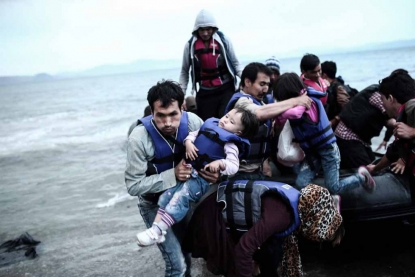 Migrants arrive on Kos. May, 2015. (AFP / Angelos Tzortzinis)
Migrants arrive on Kos. May, 2015. (AFP / Angelos Tzortzinis)For me, a photograph is not just a means of information, since everyone can find other means to inform themselves. It’s also a way of communicating with people.
I don’t like taking shocking pictures. I don’t think that it’s the shocking pictures that change the world. Of course I take such pictures because it’s part of my job, but I think that the macabre has become almost a banal element of our lives. I am not looking to change the world, but to provoke feelings.
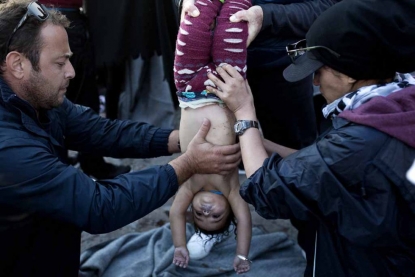 Medics try to revive a boy after a boat carrying him sunk off Lesbos. October, 2015. (AFP / Angelos Tzortzinis)
Medics try to revive a boy after a boat carrying him sunk off Lesbos. October, 2015. (AFP / Angelos Tzortzinis)Photography on a lark
I like photographing subjects other than news. Doing features or photo essays that probe deeper into a topic. I became a photographer by accident.
I come from a modest family and grew up in Egaleo, a suburb of Athens. My father died when I was young and it was me, an older brother and a younger sister.
After high school, I didn’t know what to do for work. I did odd jobs here and there. One day I talked about photography with a friend who was studying at the Leica Academy in Athens. I went to see him at the school and decided to enroll. I was 19 at the time. I enrolled on a whim – I had never before touched a camera, I didn’t even know how to put the battery in! -- but quickly became passionate about it.
While in high school I was an average student at best, at the Leica school I got really good grades, only As and Bs. All of the sudden I found myself reading, studying, being interested in things.
I am reserved by nature and I think in photography I found an easier way to communicate with people, so I decided to do it for a living.
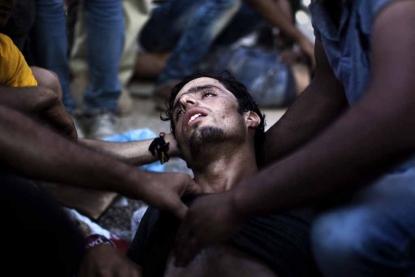 A man collapses as police try to disperse migrants in Kos. September, 2015. (AFP / Angelos Tzortzinis)
A man collapses as police try to disperse migrants in Kos. September, 2015. (AFP / Angelos Tzortzinis)When I graduated, I won an award, Greece’s young photographer of the year, and the school did a show of my photographs. It was the first time in my life that I felt I did something well. The photos were an essay of an old man suffering from a serious illness. I chose to photograph him because I was struck by the fact that he chose to live his life as if he were not suffering at all.
I didn’t work for a year after graduation and then got lucky and started working as a freelancer for AFP and Greek magazines. Over the years, I’ve also done work for other publications, including the New York Times.
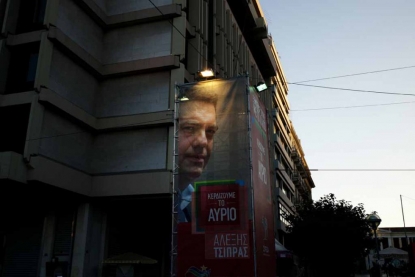 Campaign poster of far-left Syriza party leader Alexis Tzipras in Athens. September, 2015. (AFP / Angelos Tzortzinis)
Campaign poster of far-left Syriza party leader Alexis Tzipras in Athens. September, 2015. (AFP / Angelos Tzortzinis)I have been a freelancer for 10 years. Up until now, I haven’t had a choice. But it gives me a certain kind of liberty. It obligates me to take risks, both financially and professionally. Although I have to say that I am always impressed by the ‘luxury’ afforded to staff photographers – their equipment is replaced as soon as there is a problem!
Sometimes I go to cover something all alone, not on assignment. That’s what I did in May. When I saw on television the migrant corpses washing up on the shore, I decided to go to Kos. At the time, television channels were only devoting a few minutes of coverage to the topic, we didn’t realize how big this story would become.
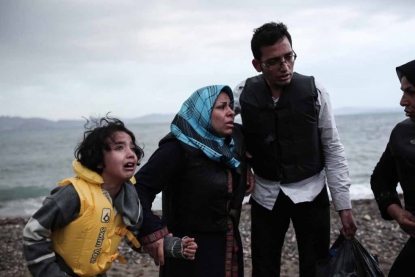 Migrants arrive on Kos. May, 2015. (AFP / Angelos Tzortzinis)
Migrants arrive on Kos. May, 2015. (AFP / Angelos Tzortzinis)In October, I followed the migrants from Greece to Hungary. That time, I didn’t sell any photos, since most media were covering the same thing. But I don’t regret going, I did it more for myself, to photograph it and to have the experience of these people’s journey.
I also went by myself to Georgia in 2009, to cover the earthquake in Haiti in 2010, the Arab Spring in Cairo in 2011, the war in Libya in 2011. For AFP, I’ve also gone on assignment to Turkey in 2013 and to Ukraine in 2014.
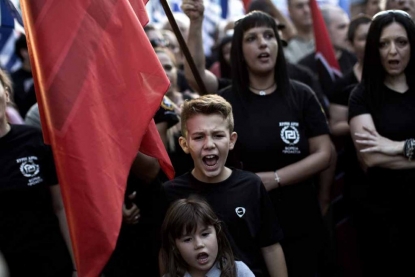 Supporters of the far-right group Golden Dawn at an Athens rally. September, 2015. (AFP / Angelos Tzortzinis)
Supporters of the far-right group Golden Dawn at an Athens rally. September, 2015. (AFP / Angelos Tzortzinis)‘Are you sure?’
Time had already published two of my essays in recent years. One on the financial crisis, the second on migration. About a month before this year's prize was announced, they called me to ask me a few details about my career. I thought they wanted a new photo essay and since they didn’t call back, I thought they’d forgotten about it. I didn’t realize at all that the phone call was linked to the prize, that I was one of the five finalists.
And then at the end of November Olivier Laurent, who is the editor of Time's LightBox site, called me to tell me that I won the “Best Wire Photographer of the Year” award for 2015.
At first I didn’t believe him. When he called I was at the Greek-Macedonian border, taking pictures of the migrants. The connection was really bad. He told me, “Congratulations, you are the photographer of the year!” I said “Are you sure? Are you sure?” I just didn’t believe it. Then a few minutes later, an email confirming the win arrived and I finally believed it.
I couldn’t resist telling a few friends who were there. They hugged and congratulated me.
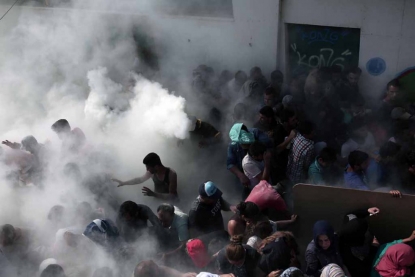 Police try to disperse migrants on Kos. August, 2015. (AFP / Angelos Tzortzinis)
Police try to disperse migrants on Kos. August, 2015. (AFP / Angelos Tzortzinis)I don’t think that winning a prize means that you’re a good photographer. Luck often contributes to the taking of a good photo. I think a good photographer is not only someone who takes nice pictures but someone who has a decent personality, since that’s reflected in the photos.
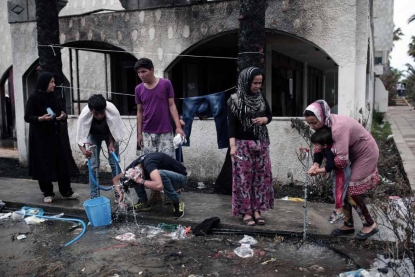 Migrants wash next to a deserted hotel in Kos. May, 2015. (AFP / Angelos Tzortzinis)
Migrants wash next to a deserted hotel in Kos. May, 2015. (AFP / Angelos Tzortzinis)I’ve been asked to do a bunch of interviews over the past few weeks, especially on television, but I’ve refused them all. I want to show who I am by my photos, not by appearing on TV.
I prefer to remain in the shadows as I work. The prize has given me a boost of hope and energy to continue my work.
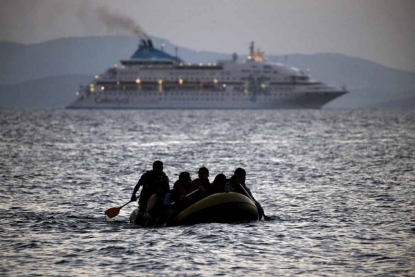 A migrant dinghy arrives in Kos. August, 2015. (AFP / Angelos Tzortzinis)
A migrant dinghy arrives in Kos. August, 2015. (AFP / Angelos Tzortzinis)It’s also great motivation for freelancers, who have to struggle every day. Like them, I was discouraged many times, asking myself why I was risking so much money and time.
The fact that a freelancer won such a prestigious prize in Greece will give other stringers hope and encouragement to continue.
Angelos Tzortzinis is a freelance photographer based in Athens. Follow him on Twitter and visit his website.
This blog was written with Helene Colliopoulou in Athens and translated by Yana Dlugy in Paris.





























